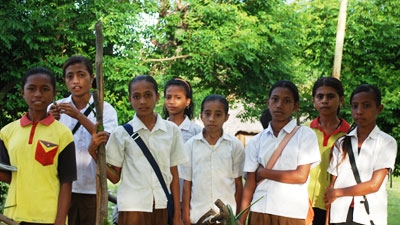Overview
Currently scheduled to finish in June 2013, the Health Sector Strategic Plan Support Project in Timor-Leste is working to improve the quality and coverage of health services, particularly for women and children, in order to accelerate progress toward the health Millennium Development Goals (MDGs). Additionally, this project is also contributing to the improvement of health facilities, access to medicines, as well as increasing essential training for health personnel.
Challenge
Following independence, Timor-Leste faced a number of challenges in delivering healthcare to its people. Eighty percent of health centers had been badly damaged during the independence struggle, and health services suffered. The health sector subsequently made steady and significant progress in re-establishing much essential infrastructure, and rebuilding a system for delivering services—resulting in real improvements in coverage and people’s overall health. However, difficulties remain in ensuring access to and demand for health services across the districts. People living in rural areas often have to walk great distances to access critical health care. Mothers in some areas have to walk for hours carrying their babies to the nearest health post. Medicine is sometimes limited. Progress towards meeting the health-related Millennium Development Goals varies between rural and urban areas, and by wealth and other social factors. The Health Sector Strategic Plan Support Project (HSSP-SP) is working to address these issues.
Approach
The HSSP-SP is working to improve accessibility, demand and quality of Timor-Leste’s health services, particularly for women and children; strengthening support systems including human resource management; and improving planning and monitoring. In order to increase the quality of health service delivery, health facilities were rehabilitated; training was provided for various clinical and non-clinical health workers; and systems for effective drug management were developed to help ensure people can access medicines when needed. In an effort to ensure that people across the country have better access to health care, an innovative outreach program of integrated health services in the suco (village) level known as SISCa (Integrated Community Health Services, Sistema Integradu Saude Communitaria) was initiated by the government. This program has been supported by nongovernmental organizations (NGOs), volunteers and community leaders and receives financial support from the International Development Association (IDA)-supported project.
Results
- Direct delivery of health services to communities across Timor-Leste has increased. Approximately 450 outreach visits are being provided every month through SISCa, partly supported by the project.
- Support for the Government of Timor-Leste to improve health infrastructure, including major work to three health posts; expansion of the national warehouse for medical equipment and supplies, and support for maintenance and repairs.
- Various short- and long-term training and professional development opportunities have been provided to health personnel for areas such as, midwifery, nursing, public health, health promotion, nutrition, and hospital management. In addition, funding has supported the reintegration of over 500 returning medical students from Cuba and other international institutions.
- Five NGOs have been contracted by the Ministry of Health to provide specific activities for service delivery and health promotion, supporting wider coverage of health services in Timor-Leste.

